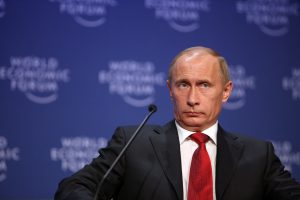No mea culpa whatsoever. There aren’t many people left who aren’t calling on Europe day and night to assert itself as quickly as possible in the face of Donald Trump, but do we hear the former Eurosceptics and other sovereigntists expressing regret for having ignored, mocked and rejected the efforts to unite our European countries for so long?
We would love to see them draw lessons from their past mistakes, if not apologise for them, but no! It is the Union that they are blaming. Not the fervour with which they were fighting against it, but the Union that they blame for the weakness we find ourselves in, with no real defence, and poorly armed against the threat of customs barriers, the threat of an agreement with Vladimir Putin at Ukraine’s expense, and the threat of the withdrawal of the United States’ military protection.
You have to pinch yourself to believe it, but that’s the way it is, and now that, thanks to Donald Trump, the need for European unity is no longer in any doubt, the question is how to close ranks and stand united.
The urgent need, many say, is to enlarge the Union to include Ukraine, the Western Balkans and Moldova, the seven candidate countries and even nine if we include Serbia and Georgia. This is necessary, they say, because if we continue to leave these countries in the antechamber, Turkey, China, the United States and, of course, Russia will try to gain a foothold and extend their areas of influence.
This is absolutely true. The danger is all too real, but the fact is that the majority of European voters are not prepared to accept a move from 27 to 34 or 36 Member States. Even if the European Parliament and the Council were to give the go-ahead, many national votes, whether in referendums or in parliament, would block it, and the Union would suffer a resounding failure from which it would take a long time to recover.
This is the first mistake not to make, and the second would be to seek to amend the Treaties in order to do away with the unanimity rule. This seems imperative because unanimity slows down the decision-making process by forcing us to search for compromises, but the problem is that any debate on amending the treaties would reopen the religious war between supporters of a federal Europe and a Europe of nations. Mistrust and misunderstandings would lead to even more rejection votes than in 2008, when the draft Constitutional Treaty was embattled. Like enlargement, the institutional route is to be avoided, but what then?
We need to act within the existing frameworks, because the political and economic developments in the Member States make this possible.
Since Donald Trump was first elected, there is no longer a single country in the Union that refuses to equip it with a common defence. What was seen until 2016 as a French whim is now a shared ambition, and the aggression against Ukraine has already led the 27 to place their ammunition orders together.
There is nothing in the current treaties to prevent this from continuing. Poland, which for so long swore by American arms purchases, is planning to invest in Airbus. The Union is going to lay the foundations for pan-European military industries, and the more Donald Trump turns his back on Europe, the more it will accelerate this assertion of a European pillar of the Atlantic Alliance.
This will not necessarily happen in unison among the 27. Not all capitals will take the same steps, because they do not all have the same financial capacity or the same desire to move forward, but nothing will prevent those who want to go further faster from doing so. The driving force behind this change will be the Weimar triangle – France, Poland and Germany – because there is a Polish consensus on the need to increase the Union’s military budgets, France has always argued in favour of making Europe a player on the international stage and Germany, which is in the process of evolving, will soon agree to the Union borrowing to finance its defence efforts.
Within this triangle, the Franco-Polish entente is deepening and becoming decisive. Great Britain, for its part, will draw closer to the Union by supporting the Weimar Triangle on military issues. As for Ukraine, although it will not immediately become a full member of the Union, it should associate its defence industry with the creation of pan-European military industries, of which it will become one of the key promoters.
Common defence means common industrial policies and diplomacy. It is by doing rather than by talking that Europe will assert itself around shared objectives and civil and military projects. Within the European Political Community, a forum of 44 States created after the entry of Russian troops into Ukraine, the 27 Member States and the candidate countries will thus develop a common whole whose logic and usefulness will no longer be questionable. Many of the pieces of this jigsaw puzzle have yet to fit together, but many have already done so, suggesting a new European landscape. Attacked by Russia, abandoned by America, a power is assembling.




